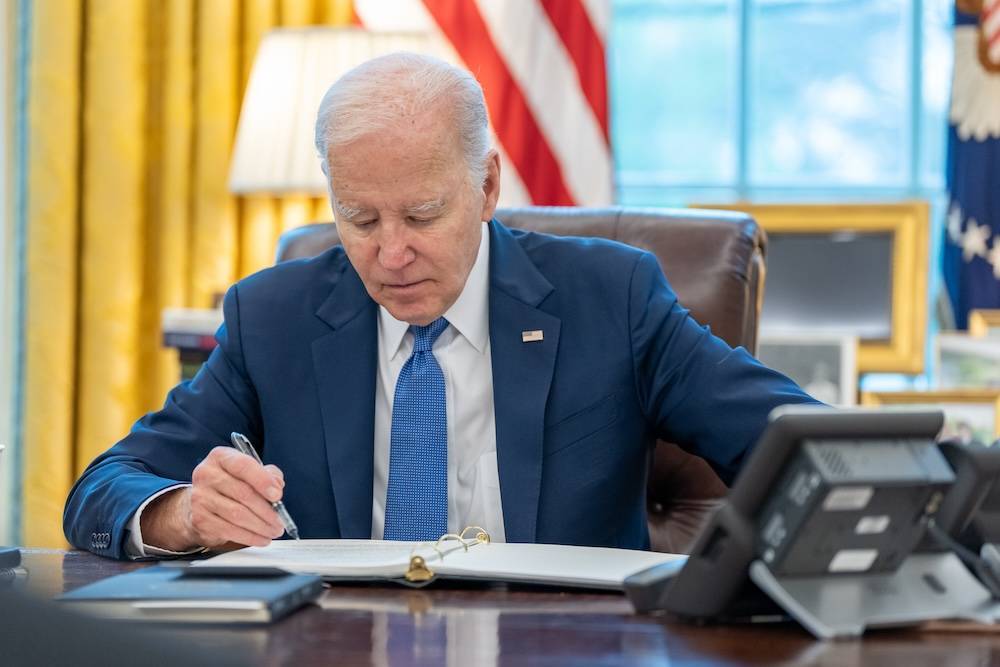The escalation of tensions in the Middle East, marked by Iran's response to Israel, raises the possibility of a large-scale regional conflict. This context casts a shadow over the re-election chances of U.S. President Joe Biden for a second term, due to potential repercussions on the United States, which could find itself at the heart of a new conflict in the Middle East.
Since the start of the conflict in Gaza on October 7, Biden's main priority has been to prevent the conflict from extending to a regional scale, which would force America to deploy troops for another foreign conflict. Upon entering the White House three and a half years ago, the Democratic president committed to ending the "forever wars" America had been waging in Iraq and Afghanistan since the September 11, 2001 attacks in New York and Washington.
In line with this commitment, Biden withdrew American troops from Afghanistan, despite criticism over the "chaotic" nature of this withdrawal in August 2021. When the war in Ukraine broke out, Biden pledged military and economic support to Ukraine "as long as necessary" to counter Russia, but without deploying American troops. Indeed, Biden generously sent military supplies and revitalized NATO, gathering unprecedented Western support, while avoiding direct combat involvement, fearing a repeat of scenarios like Iraq or Afghanistan.
With the sudden outbreak of war in Gaza, Biden faced a new challenge, perhaps more complex than that posed by Ukraine. He quickly provided military, political, and economic support to Israel following the October 7 incident. An airlift rapidly delivered tens of thousands of shells and missiles to Israel, meeting the needs of its war against Gaza.
At the same time, Biden strived to prevent escalation into a wider regional conflict. To this end, he deployed the aircraft carrier "Gerald Ford" to the Mediterranean as a deterrent against Iran, while the aircraft carrier "Eisenhower" patrolled the waters of the Gulf.
When the Houthis began targeting ships heading to or leaving the Israeli port of Eilat last November, the United States formed an international coalition, "Guardian of Prosperity," to secure navigation in the Red Sea. The American military also launched raids against the Houthis to reduce their ability to attack tankers and commercial ships passing through Bab-el-Mandeb.
After an American military base in northern Jordan was attacked earlier this year by a drone launched by Iraqi factions, Washington responded with airstrikes against these factions, leading to an undeclared truce between the two sides. At the time, it was said that Tehran had pressured its Iraqi allies to stop targeting American soldiers deployed in Iraq and Syria as part of the international coalition against the Islamic State (ISIS).
The turning point in the ongoing conflict was Israel's attack on the Iranian consulate in Damascus on April 1, which killed seven members of the Iranian Revolutionary Guards, including General Mohammad Reza Zahedi, head of the Quds Force in Lebanon and Syria.
This significant Israeli attack, too great for Iran to ignore, put the Biden administration in a difficult position, forcing it to distance itself while reiterating that the United States would defend Israel in the event of Iranian retaliation.
This was confirmed last night when the Iranian Revolutionary Guards launched 300 drones and missiles towards Israel. Washington played a key role in intercepting them before they reached Israeli airspace.
In response to this American involvement, Biden was clear during the phone call he had with Israeli Prime Minister Benjamin Netanyahu that night, stating that America was firmly committed to Israel's security, but he also urged the Hebrew state not to attack Iran, specifying that the United States would not participate in such an offensive.
But what would happen if Netanyahu decided to retaliate against Iran, as suggested by several Israeli officials?
Biden, in an election year, fears that America could be drawn into a conflict in the Middle East if the confrontation between Iran and Israel escalated. On one hand, he would not give up defending Israel and, at the same time, he would be unable to contain Netanyahu.
A regional conflict would lead to a rise in oil prices, resulting in increased inflation in the United States as the elections approach in seven months. This would in turn impact Biden's support rate.
On the other hand, Biden would face another dilemma if he was forced to send American troops to the Middle East, if the conflict between Iran and Israel expanded and American troops in the region were attacked by Iran.
Clearly, American military involvement in the war against Iran and its allies in the region would lead to an even greater decrease in support for Biden in the upcoming November elections.
After Biden's failure to persuade Netanyahu to accept a ceasefire, even a temporary one, in Gaza, he is now faced with a larger dilemma, which could cost him a second term in the White House.
Please post your comments on:
[email protected]
 Politics
Politics








